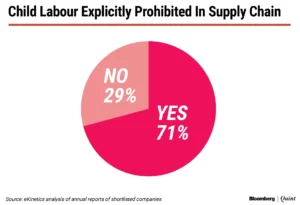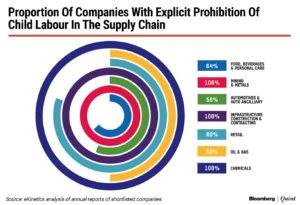
Workers assemble mobile phones at a factory in Noida, Uttar Pradesh.
Workers assemble mobile phones at a factory in Noida, Uttar Pradesh. (Photographer: Anindito Mukherjee/Bloomberg)
Are Indian Businesses Walking The Talk On Labour Rights?
The Covid-19 pandemic’s first wave and the migrant workers crisis underscored labour problem issues that India faces. The last couple of years have also been significant with the union government pushing for labour codes with staunch oppositions and challenges from various quarters.
With heightened attention on environmental, social and corporate governance across the world, Indian companies too are being questioned regarding their stance, as detailed in the Business Responsibility and Sustainability Report or BRSR – a reporting mechanism to push integrated reporting on environmental, social, and governance parameters. This standardised reporting format offers a baseline to draw a comparison between ESG goals across companies and sectors.
How Have These Voluntary BRSR And ESG Disclosures Fared?
Workers’ rights should be at the core of labour and human working problems but a recent report by Oxfam India and cKinetics shows otherwise.
BRSR disclosures by 35 companies across six sectors, for financial year 2019-20, shows a huge gap between commitment and compliance towards social goals.
The companies analysed are from the automobile, mining and metal, infrastructure and construction, oil and gas, pharmaceutical, food and personal care, and chemical sectors.
Only 20% have any sort of monitoring of minimum wages which includes explicitly stating that the company is compliant with national laws as those for payment of wages.
This reporting on compliance is nearly negligible in the supply chain of these companies.
71% of companies have explicitly prohibited child labour in their supply chain however only one company has undertaken timely assessments to do regular onsite checks.
Similarly, about 70% of companies explicitly mention that they respect the rights of the workers to collective bargaining in their company code of conduct but there is no clarity about who is covered under this provision.
This is of significance because temporary/contractual employees account for 77% of the total employment in this sample set and are at a greater risk of unemployment.
While companies across sectors have a code of conduct or policy for suppliers in their operations, traceability of assessment is still questionable.
In order to understand labour rights compliance by business, it is essential to look at BRSR.
While minimum laws on minimum wages or equal remuneration are driven by the government, a new set of norms and standards is being pushed by customers, investors, and global institutions to nudge businesses to document labour conditions in their operations.
The latter is adapted in India as Business Responsibility and Sustainability Reporting, a revamped version of SEBI’s 2012 Business Responsibility Reporting framework. The new BRSR implementation is phased and mandatory for 1,000 top listed companies after FY22. It is thus still in nascent stages and steadily evolving.
As per BRSR’s social certification standards, businesses are required to report on a ban on child labour and forced labour, humane working conditions, guaranteed a living wage, non-discriminatory practices, systems for improvement of working conditions, right to freedom of association, and commitment to a maximum working period of 48 hours per week with one free day.
The compliance and commitment of businesses to protect labour and human working problems and regulatory compliance issues can be pinned down only if all the parties concerned, come together and exhibit greater impetus by means of undertaking regulatory measures that demand corrective action and solutions. And the fastest way to do this check is to undertake vendor compliance audit which is carried out by Karma Management on month-to-month basis for all establishments and vendor partners
In this respect, Karma Management Global Consulting Solutions Pvt. Ltd. with its headquarters at Santacruz East in Mumbai and having pan India present with over 200 direct and indirect staff and about 6000 outsourced employees at various clients organization, has tremendous experience and expertise to render all kinds of regulatory and statutory labour laws services including payroll and outsourcing, on-boarding services.
Please approach our Marketing Department for further information and for all kinds of queries which will be answered immediately with complete details. You may dial our board line number (022) 42 44 44 44 for any general information.



